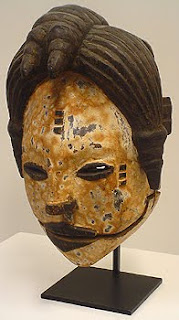Mask Designs
The purpose of the mask usually dictates the design elements the artist will use. They are frequently grouped as:
Anthropomorphic - masks with predominately human features that personify ancestral spirits
Zoomorphic - masks with predominately animal features that personify the supernatural power of the animal kingdom,
Theriomorphic - masks with combinations of human and animal design elements that symbolize a combination of spiritual powers
Materials
Most of the masks in the Lynn University collection are of carved wood. Many are have overlay materials such as bronze or fabrics; many are wood with shells, iron, grass, fabric and feathers. The mask will often be colored with the use of natural pigments like plant juices and oils, animal fat, blood, kaolin and mud. Mask making is a specialized art in Africa whose practitioners occupy a very respected place in the society. The wood carvers who create these objects undergo an apprenticeship that ensures the design integrity of the mask. African spirituality includes the belief that deities may transform objects and that both the material and the artist’s tools may impart spiritual powers to the mask.
Uses of Masks
African tribes rely on rituals to convey and reinforce social mores and tribal history. Rituals usually include dances or processions of those individuals who are responsible for ensuring the continuity of the social mores from generation to generation. Although the content of the ritual varies among tribal groups, common human events inspire similar rituals throughout Africa.
Fertility rituals honor the deities who ensure continuing generations of the tribe through human, animal and agricultural fertility.
Initiation rituals are ceremonies that mark transitions from adolescence to adulthood and progressions through various stages of societal membership.
Funeral rituals: One of the most important uses of masks is African cultures is at the end of life. During funeral ceremonies, masks are used to communicate with ancestral spirits on behalf of the recently departed to insure their transition into the spirit world. A variety of masks maybe used to evoke the deities who will protect the dead from evil along the path to the spirit world
Social behavior is a predominant motive for masks in African society. Conveying moral and ethical codes is frequently the responsibility of secret societies that seek to guide their members’ behavior. Those in the society who judge others’ behavior wear masks that evoke ancestral wisdom. Masks are also worn during many social occasions where prescribed behaviors are important including royal celebrations, weddings, and arrival of important visitors, political debates, and tax collection. Masks are also used as identification or passports when traveling through different regions.
Guardians: In African cultures, an important role for secret societies and tribal leaders is safeguarding the community. Threats to the well being of individuals and the community are confronted by evoking powerful spirits through the use of masks in rituals that seek the assistance of the supernatural in overcoming the threat.
The purpose of the mask usually dictates the design elements the artist will use. They are frequently grouped as:
Anthropomorphic - masks with predominately human features that personify ancestral spirits
Zoomorphic - masks with predominately animal features that personify the supernatural power of the animal kingdom,
Theriomorphic - masks with combinations of human and animal design elements that symbolize a combination of spiritual powers
Materials
Most of the masks in the Lynn University collection are of carved wood. Many are have overlay materials such as bronze or fabrics; many are wood with shells, iron, grass, fabric and feathers. The mask will often be colored with the use of natural pigments like plant juices and oils, animal fat, blood, kaolin and mud. Mask making is a specialized art in Africa whose practitioners occupy a very respected place in the society. The wood carvers who create these objects undergo an apprenticeship that ensures the design integrity of the mask. African spirituality includes the belief that deities may transform objects and that both the material and the artist’s tools may impart spiritual powers to the mask.
Uses of Masks
African tribes rely on rituals to convey and reinforce social mores and tribal history. Rituals usually include dances or processions of those individuals who are responsible for ensuring the continuity of the social mores from generation to generation. Although the content of the ritual varies among tribal groups, common human events inspire similar rituals throughout Africa.
Fertility rituals honor the deities who ensure continuing generations of the tribe through human, animal and agricultural fertility.
Initiation rituals are ceremonies that mark transitions from adolescence to adulthood and progressions through various stages of societal membership.
Funeral rituals: One of the most important uses of masks is African cultures is at the end of life. During funeral ceremonies, masks are used to communicate with ancestral spirits on behalf of the recently departed to insure their transition into the spirit world. A variety of masks maybe used to evoke the deities who will protect the dead from evil along the path to the spirit world
Social behavior is a predominant motive for masks in African society. Conveying moral and ethical codes is frequently the responsibility of secret societies that seek to guide their members’ behavior. Those in the society who judge others’ behavior wear masks that evoke ancestral wisdom. Masks are also worn during many social occasions where prescribed behaviors are important including royal celebrations, weddings, and arrival of important visitors, political debates, and tax collection. Masks are also used as identification or passports when traveling through different regions.
Guardians: In African cultures, an important role for secret societies and tribal leaders is safeguarding the community. Threats to the well being of individuals and the community are confronted by evoking powerful spirits through the use of masks in rituals that seek the assistance of the supernatural in overcoming the threat.


